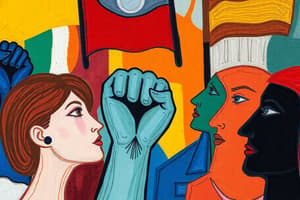Podcast
Questions and Answers
Which historical event greatly influenced the emergence of the first generation of human rights?
Which historical event greatly influenced the emergence of the first generation of human rights?
- The Industrial Revolution
- World War II
- The Mexican Revolution
- The French Revolution (correct)
Which of the following characterizes the primary focus of the first-generation human rights?
Which of the following characterizes the primary focus of the first-generation human rights?
- Collective rights and economic welfare
- Individual liberties and political participation (correct)
- Rights of specific groups such as children and minorities
- Environmental protection and cultural heritage
What is a key obligation that first-generation human rights impose on the State?
What is a key obligation that first-generation human rights impose on the State?
- To respect the fundamental rights of individuals (correct)
- To actively provide economic resources to all citizens
- To ensure equal representation in government for all groups
- To promote cultural events and artistic expression
The second generation of human rights is most closely associated with which type of rights?
The second generation of human rights is most closely associated with which type of rights?
What historical context is associated with the rise of second-generation human rights?
What historical context is associated with the rise of second-generation human rights?
Which country's constitution was among the first to include social rights, influencing the development of second-generation human rights?
Which country's constitution was among the first to include social rights, influencing the development of second-generation human rights?
What is a key characteristic of the State's obligation concerning second-generation human rights?
What is a key characteristic of the State's obligation concerning second-generation human rights?
What is the primary focus of the third generation of human rights?
What is the primary focus of the third generation of human rights?
What global issue prompted the development of third-generation human rights?
What global issue prompted the development of third-generation human rights?
Which of the following best describes the scope of third-generation human rights?
Which of the following best describes the scope of third-generation human rights?
Which of these examples is a right typically associated with the first generation of human rights?
Which of these examples is a right typically associated with the first generation of human rights?
Which of the following is an example of a second-generation human right?
Which of the following is an example of a second-generation human right?
Which of the following falls under the umbrella of third-generation human rights?
Which of the following falls under the umbrella of third-generation human rights?
What is the primary duty imposed on the State by first-generation human rights?
What is the primary duty imposed on the State by first-generation human rights?
Which statement accurately distinguishes between second and third-generation human rights?
Which statement accurately distinguishes between second and third-generation human rights?
Flashcards
First-Generation Human Rights
First-Generation Human Rights
Rights that respect fundamental human requirements like life, liberty, and equality.
Second-Generation Human Rights
Second-Generation Human Rights
Rights related to social, economic, and cultural aspects, ensuring collective well-being.
Third-Generation Human Rights
Third-Generation Human Rights
Rights promoting global cooperation and solidarity among nations and groups.
Historicist Approach
Historicist Approach
Signup and view all the flashcards
Hierarchical Approach
Hierarchical Approach
Signup and view all the flashcards
Fundamental Liberties
Fundamental Liberties
Signup and view all the flashcards
Civil and Political Rights
Civil and Political Rights
Signup and view all the flashcards
Freedom of Transit
Freedom of Transit
Signup and view all the flashcards
Freedom of Assembly
Freedom of Assembly
Signup and view all the flashcards
Right to legal personality
Right to legal personality
Signup and view all the flashcards
Right to be elected
Right to be elected
Signup and view all the flashcards
Right to Vote
Right to Vote
Signup and view all the flashcards
Right to a fair wage
Right to a fair wage
Signup and view all the flashcards
Freedom of Association
Freedom of Association
Signup and view all the flashcards
Right to take part freely in cultural life
Right to take part freely in cultural life
Signup and view all the flashcards
Study Notes
The Three Generations of Human Rights
- Human rights can be classified in different ways, such as through a historicist approach, which considers the progressive protection of human rights, or through a hierarchy approach, which distinguishes between essential and complementary rights
Three Generations of Rights
- The best-known classification distinguishes the Three Generations of Human Rights, based on a periodic approach that focuses on the progressive coverage of Human Rights
First Generation
- Emerged during the French Revolution as a rebellion against the absolutist monarchy
- Encompasses civil and political rights
- Impose a duty on the State to always respect the fundamental rights of human beings, like life, liberty, and equality
Second Generation
- Consists of collective rights, specifically social, economic, and cultural rights
- These rights arose from the Industrial Revolution
- Mexico was one of the first countries to include social rights in its constitution in 1917
- They require the State to take action and are progressively satisfied based on economic capabilities
Third Generation
- Formed by the rights of peoples, also known as solidarity rights
- These rights have emerged in our time due to the necessity of cooperation between nations and diverse groups
First Generation Rights
- These rights comprise fundamental liberties, as well as civil and political rights
- They are the oldest in their normative development
- These rights belong to the individual in relation to the State or any authority
Characteristics of First-Generation Rights
- The State is always obligated to respect these rights and can only limit them under the conditions stipulated in the Constitution
- These rights imply respect and no impediments
- Every human being generally holds civil rights; every citizen holds political rights
- Individuals can claim these rights themselves
Examples of First-Generation Rights
- Freedom of transit is classified as a fundamental liberty; for example, one can freely travel through their country
- Freedom of assembly and association is a fundamental liberty; for example, one may peacefully meet or associate with others to make improvements for the community
- The right to recognition of legal personality is a civil right; for example, one has the right to a name, domicile, and civil status
Fundamental Rights and Liberties
- Everyone has fundamental rights and liberties, regardless of race, color, language, or social or economic standing
- People are entitled to life, liberty, and legal security
- Men and women are entitled to equal rights
- No one shall be subjected to slavery or servitude
- No one shall be subjected to torture or cruel, inhuman, or degrading treatment or punishment, nor can they be physically, psychologically, or morally harmed
- One's private life, family, home, or correspondence may not be subjected to arbitrary interference, nor may one's honor or reputation be attacked
- Everyone has the right to move freely and choose their place of residence
- Everyone has a right to nationality
- Every person has the right to seek asylum from political persecution and enjoy it in any country
- Men and women have the right to marry and decide how many children they want
- Everyone has the right to freedom of thought and religion
- Everyone is entitled to freedom of opinion and expression
- Everyone has the right to peaceful assembly and association
Civil and Political Rights
- Every human is entitled to recognition of their legal personality
- Everyone is equal before the law and everyone must be treated equally
- Everyone has the right to a trial for protection of rights
- No one may be arbitrarily detained, imprisoned, or exiled
- Everyone is entitled to be heard and treated fairly by an impartial tribunal
- Anyone accused of a crime is presumed innocent until proven guilty according to law
- Everyone has the right to take part in the government of their country
- Everyone has the right to hold public office in their country
- The will of the people is the basis of public authority and will be expressed through genuine elections
Second Generation Rights
- Economic, Social and Cultural Rights are the rights included in the second generation
- They are rights of social content for the purpose of securing better living conditions
Characteristics of Second-Generation Rights
- Expands the scope of the State's responsibility and imposes a positive duty on the part of the State
- Concerns the satisfaction of needs and provision of services
- Individuals are defended by someone in their community
- Their claim is mediate and indirectly conditioned by the economic possibilities of the country
- The aspirations of society are legitimate
Examples of Second-Generation Rights
- The right to fair wages is an economic right
- For example, everyone is entitled to earn a wage high enough to maintain an adequate standard of living
- Freedom of association is a social right
- For example, everyone has the right to form labor organizations
- The right to participate freely in cultural life is a cultural right
- For example, everyone has the right to visit museums, archaeological sites
Economic, Social, and Cultural Rights
- Everyone is entitled to social security and fulfillment of their economic, cultural, and social rights
- Everyone is entitled to equitable and satisfactory working conditions
- Everyone has the right to form unions to protect their interests
- Each person has the right to an adequate standard of living that guarantees them, as well as their family, health, food, clothing, housing, medical care, and necessary social services
- Everyone is entitled to physical and mental health
- Mothers and children are entitled to special care and assistance
- Everyone has the right to education in its various forms
- Primary and secondary education will be compulsory and free
- Everyone has the right to public safety
- Parents have the right to choose what kind of education their children will receive
Third Generation Rights
- Third-generation rights are also called rights of the peoples or solidarity derechos
- These rights refer to three types of assets which can be encompassed in peace, development, and the environment
- There are 3 types of rights, civil and political, economic, social and cultural, and cooperation between peoples
Characteristics of Third-Generation Rights
- They belong to imprecise groups of individuals with a general interest in common
- Their fulfillment requires action that is positive, in order to do, to give, and negative, in order to not do
- These are rights of both a State and the whole of the International Community
- Although the State is their proprietor, they may be demanded before the State itself, in the case of groups belonging to the State, or the opposite State, in the case of the International Community, that is, of one nation by another
Examples of Third-Generation Rights
- Ethnic groups have the right to economic development
- Every country is entitled to select its form of government
- All countries are entitled to receiving benefit from the common heritage of humanity
- No country should attack another
The Rights of Peoples Include
- Self-determination
- Economic and political independence
- National and cultural identity
- Peace
- Peaceful coexistence
- Understanding and trust
- International and regional cooperation
- Development
- International social justice
- The use of advancements in science and technology
- Solving food, demographic, educational, and ecological problems
- A healthy environment
- The common heritage of humanity
- Development that allows a decent life
Studying That Suits You
Use AI to generate personalized quizzes and flashcards to suit your learning preferences.




